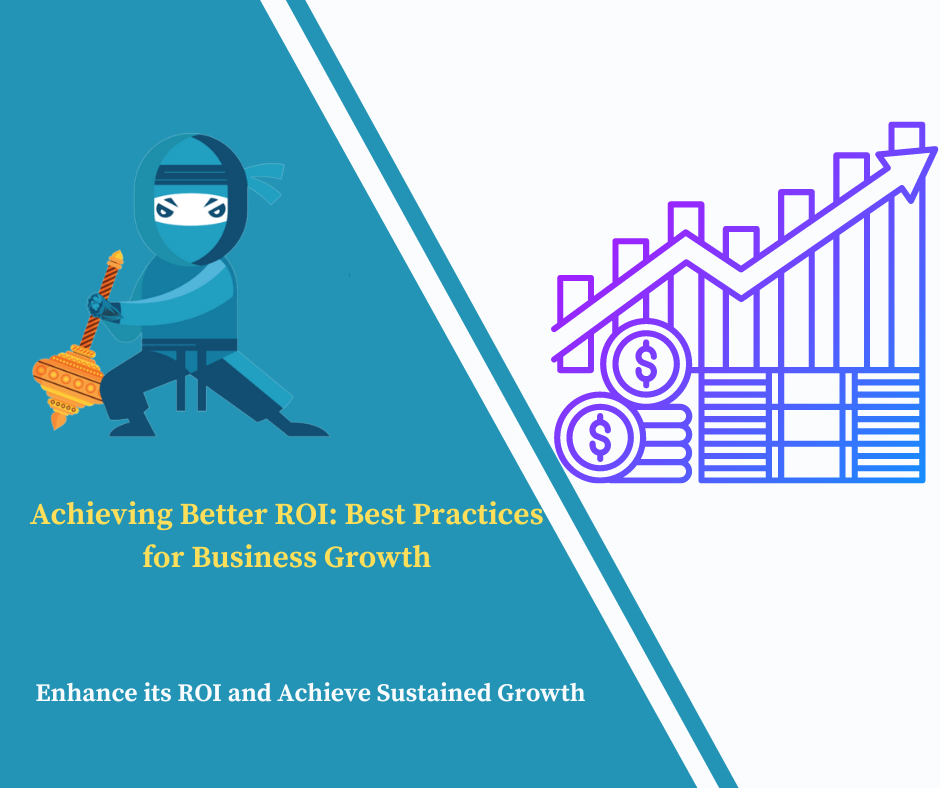Achieving Better ROI: Best Practices for Business Growth
In today’s competitive market, achieving better Return on Investment (ROI) is essential for sustainable business growth. ROI is not just a financial metric; it reflects how effectively a business utilizes its resources to generate profit. With the right strategies, companies can optimize their ROI, ensuring they grow steadily and achieve their long-term goals. This article explores best practices that can help businesses enhance their ROI, fostering sustainable growth.
Understanding ROI and Its Importance
Return on Investment (ROI) is a performance measure used to evaluate the efficiency or profitability of an investment. It is calculated by dividing the net profit from an investment by the cost of the investment. ROI is a critical metric for businesses as it helps them assess the success of their investments, whether in marketing, technology, or human resources.
For business growth, improving ROI means making smarter decisions about where to allocate resources. High ROI indicates that the business is getting a good return on its investments, which is a key driver of growth. On the other hand, a low ROI suggests that the business may need to re-evaluate its strategies to ensure resources are being used effectively.
Best Practices for Achieving Better ROI
1. Focus on Customer Retention
One of the most effective ways to improve ROI is by focusing on customer retention. Acquiring new customers is often more expensive than retaining existing ones. Loyal customers not only provide repeat business but are also more likely to recommend your products or services to others, leading to organic growth.
To enhance customer retention, businesses should invest in excellent customer service, loyalty programs, and personalized marketing strategies. Regularly engaging with customers through follow-up emails, special offers, and feedback surveys can also strengthen customer relationships, leading to higher retention rates and, consequently, better ROI.
Also read: Top Tips to Enhance ROI on Your Marketing Campaigns
2. Optimize Marketing Strategies
Marketing is a significant area where businesses can either gain or lose ROI. To maximize the effectiveness of marketing efforts, businesses should focus on targeted marketing strategies. This involves understanding your target audience, segmenting your market, and crafting personalized marketing messages that resonate with each segment.
Utilizing data analytics can help businesses track the performance of their marketing campaigns in real-time. By analyzing metrics such as conversion rates, click-through rates, and customer acquisition costs, businesses can fine-tune their strategies to improve ROI. Additionally, investing in content marketing, search engine optimization (SEO), and social media marketing can drive more qualified leads to your business, boosting growth and ROI.
3. Invest in Employee Development
Employees are one of the most valuable assets for any business. Investing in employee development not only enhances their skills but also increases their productivity, leading to better business outcomes. Training programs, workshops, and continuous learning opportunities can equip employees with the necessary skills to perform their roles more effectively.
Moreover, fostering a positive work environment and offering competitive compensation can improve employee satisfaction and reduce turnover rates. When employees are motivated and engaged, they contribute more to the business, leading to higher efficiency and, ultimately, better ROI.
Also read: Why Your ROI is Falling Short (And How to Fix It)
4. Streamline Operations
Operational inefficiencies can significantly impact ROI. Streamlining operations by automating repetitive tasks, optimizing supply chains, and improving workflow processes can lead to cost savings and increased productivity. Businesses should regularly review their operations to identify bottlenecks and areas for improvement.
Implementing technologies such as Enterprise Resource Planning (ERP) systems or Customer Relationship Management (CRM) software can also enhance operational efficiency. These tools provide real-time data and insights, enabling businesses to make informed decisions quickly, thereby improving ROI and supporting business growth.
5. Leverage Technology and Innovation
In the digital age, leveraging technology is crucial for achieving better ROI. Investing in the right technology can help businesses automate processes, reduce costs, and improve customer experiences. For example, adopting e-commerce platforms, mobile apps, or cloud-based solutions can open up new revenue streams and improve operational efficiency.
Innovation is also key to staying ahead of the competition. Businesses should continuously explore new ways to improve their products, services, and processes. Whether it’s through research and development, adopting new technologies, or entering new markets, innovation drives growth and enhances ROI.
6. Measure and Analyze Performance
Regularly measuring and analyzing business performance is essential for improving ROI. Key Performance Indicators (KPIs) such as profit margins, customer lifetime value, and operational costs should be closely monitored. Businesses should use data analytics to gain insights into what is working and what isn’t.
By understanding the factors that contribute to high or low ROI, businesses can make informed decisions about where to invest their resources. Continuous performance monitoring allows businesses to stay agile, making necessary adjustments to strategies in real time to optimize growth and ROI.
FAQs
What is the role of ROI in business growth?
ROI plays a crucial role in business growth by helping businesses evaluate the effectiveness of their investments. High ROI indicates that a business is using its resources efficiently to generate profit, which is essential for sustainable growth.
How can customer retention improve ROI?
Customer retention improves ROI by reducing the costs associated with acquiring new customers. Loyal customers provide repeat business and often refer others to the business, leading to organic growth and better ROI.
Why is it important to optimize marketing strategies?
Optimizing marketing strategies is important because it ensures that marketing efforts are targeted and effective. By focusing on the right audience and using data-driven insights, businesses can maximize their marketing ROI and drive growth.
important to optimize marketing strategies?
Employee development impacts ROI by increasing employee productivity and satisfaction. Well-trained and motivated employees contribute more to the business, leading to higher efficiency and better ROI.
What are some ways to streamline operations?
Some ways to streamline operations include automating repetitive tasks, optimizing supply chains, and improving workflow processes. Implementing technologies such as ERP or CRM systems can also enhance operational efficiency, leading to better ROI.
How can businesses leverage technology for better ROI?
Businesses can leverage technology for better ROI by adopting tools and platforms that automate processes, reduce costs, and improve customer experiences. Innovation and the adoption of new technologies are also crucial for staying competitive and driving growth.
Conclusion
Achieving better ROI is essential for business growth. By focusing on customer retention, optimizing marketing strategies, investing in employee development, streamlining operations, leveraging technology, and continuously measuring performance, businesses can enhance their ROI. These best practices not only improve profitability but also set the stage for sustainable growth, ensuring long-term success in a competitive market. Incorporating these strategies will help businesses make informed decisions, allocate resources more effectively, and ultimately achieve better ROI. As businesses grow and evolve, maintaining a focus on ROI will ensure they remain on the path to success.








